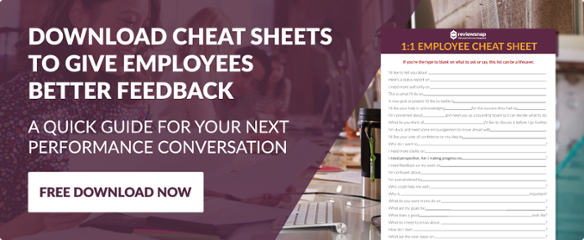Performance Management that Won’t Scare the New Hire

You’ve heard the news. When it comes to hiring a new employee, you have maybe a month to impress and engage them into your organization. In fact, though nearly a third of new hires are seeking new employment within the first 6 months, up to 20% of turnover happens in the first 45 days.
All the turnover talk probably has you wanting to plan fun outings, slack on deadlines and create a laid back, fun environment for your new hires those first few weeks, right? Save the real tough work for a few months down the line…
Wrong.
We encourage fun, introductory games to get your new hire acclimated to the new team, but nothing good comes from a lackadaisical approach to performance management. Part of understanding your company culture is receiving a full immersion into its performance management standards. Need help finding a balance of serious, but welcoming? It’s not as difficult as you think…
Tweet This: Up to 20% of turnover happens within the first 6 months. Change this:
COMBINE ON-THE-JOB AND FORMAL TRAINING
Bringing together a team of individuals means you have differing strengths and weaknesses. It can be a challenge to create training programs that cater to the learning styles of all new hires, but a combination of on-the-job and formal training answers to the masses.
Some employees can read text or learn from audible lectures, while others need to physically follow the steps in order to remember properly. A formal introduction to procedures and guidelines prepares new hires for the varying tools and skills they will use. The on-the-job portion will ensure the new hires can actually perform the task through a guided lesson.
Did you know? 7 out of 10 people say training and development influenced their decision to stay with a company?
Tweet This: 7 out of 10 people say training & dev influenced their decision to stay with a company.
MENTORING AND COACHING
One of the best ways to facilitate on-the-job training is with a mentoring and coaching program that begins immediately and continues throughout employment. Firstly, mentorships are beneficial for each party involved. The employee has a colleague who they are comfortable approaching with questions of all shapes and sizes and the mentor sharpens their own skills by helping the new hire work through problems.
“The protege effect,” as Annie Murphy Paul (@anniemurphypaul) describes, is when a teacher performs better than their colleagues who are learning for the sake of learning.
Tweet This: .@anniemurphypaul talks about “the protege effect” when a teacher performs better than their colleagues:
DISCUSS STANDARDS DAY ONE
It may seem harsh, but the new hire will learn expectations eventually so you might as well share them right away. That way the most accurate information is shared, avoiding surprises and creating dialogue before they’re in the field. It might be a little frightening at first, but the new employee will appreciate a full scope view of their job, especially when the alternative is not knowing the requirements until they’re actually performing. No employee wants the first mention of performance standards to happen in a performance review via corrective feedback.
Did you know? 71% of employees prefer immediate feedback.
CONNECT MEANING TO PROCESS
Because that’s the way we’ve always done it is quite possibly the worst reason to continue a process. If you can’t explain why you have always performed a task a certain way, then it might be time to reevaluate the process. It’s important that your employees, new and tenured, can see the connection between their work and the company’s success. That sense of purpose will motivate employees to own their deliverables and prioritize quality work, propelling performance. That means, the moment your new hire takes to the floor, they should be receiving tasks that actually benefits the company or their new team. And don’t be shy about explaining how it does either. The new hire will be excited for the responsibility and the confidence you already have in them.
Did you know? 88% of employees who feel a sense of purpose in their work plan to remain with their employer for more than 5 years.
Look, we sympathize that setting performance standards for new hires is challenging. You want the right amount of welcome and seriousness in those pivotal first days of employment, so bringing in the reality of expectation can seem a little overwhelming. Just remember that even new employees want transparency and responsibility. Performance management should start on day one.
Related Posts:

